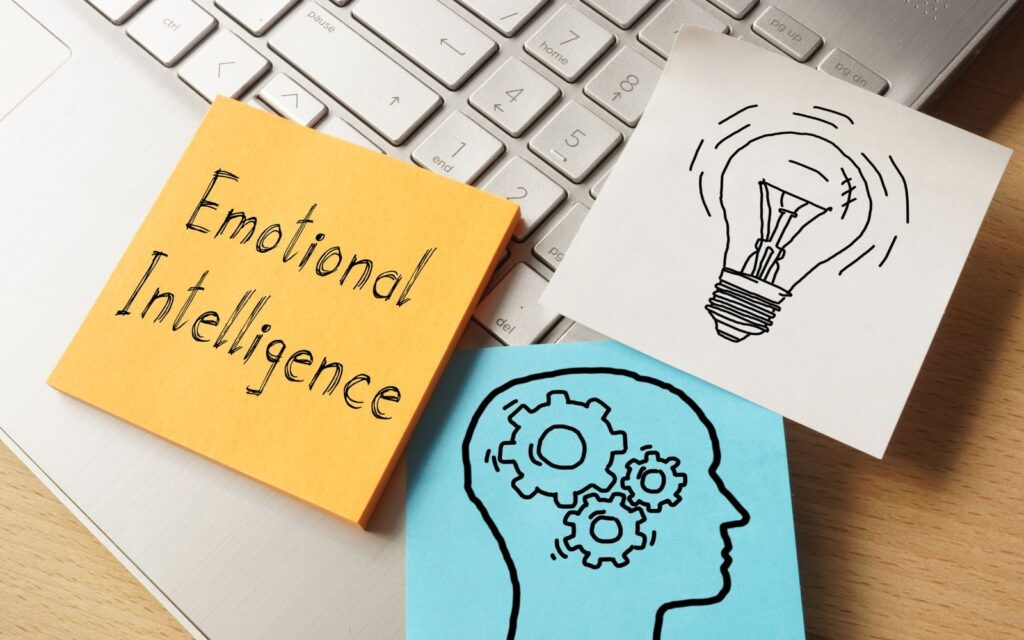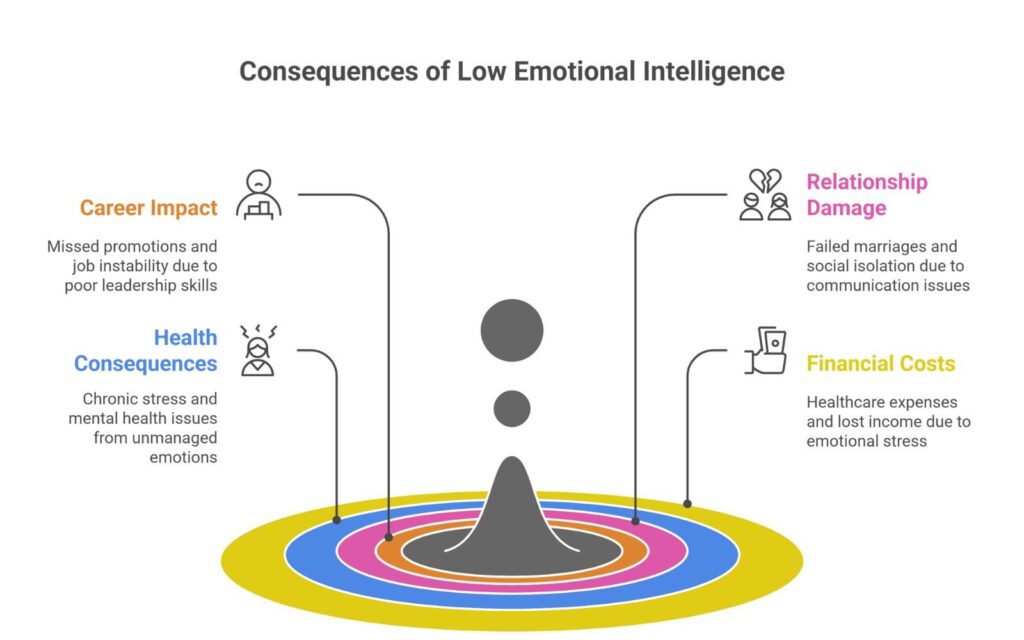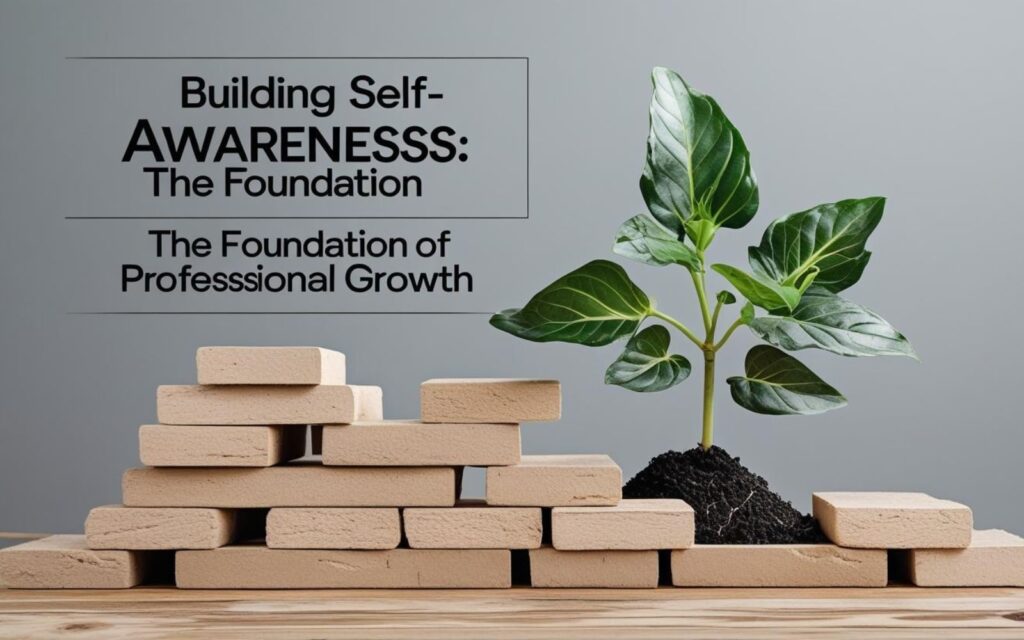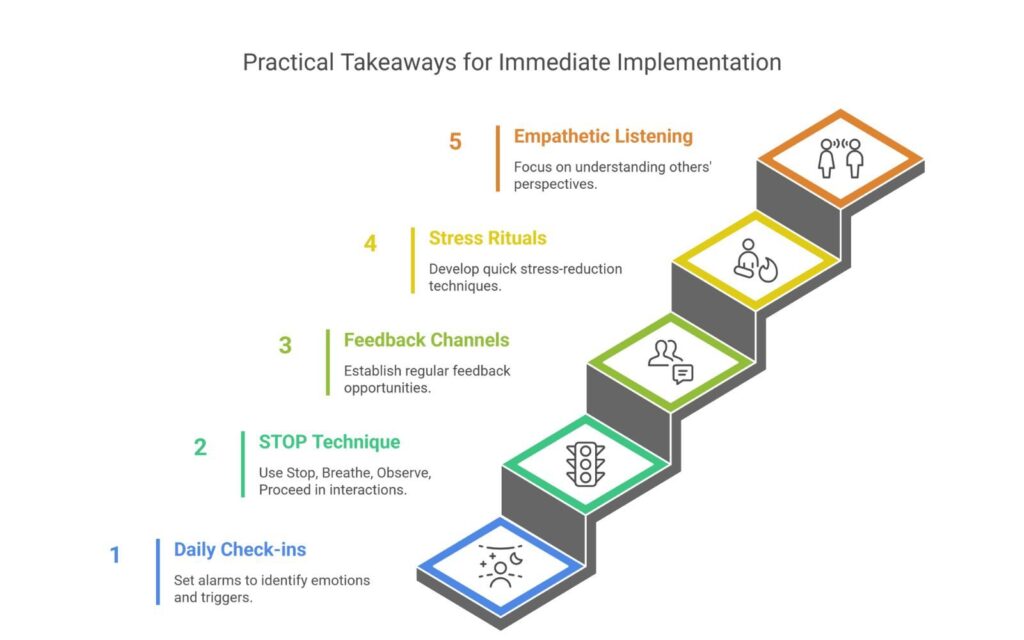How Emotional Intelligence for Professional Success Can Transform Your Career and Create Better Work-Life Balance

Did you know that 90% of top performers have high emotional intelligence, while only 20% of bottom performers possess this crucial skill? In today’s fast-paced professional ecosystem, technical expertise alone isn’t enough to guarantee career advancement.
The ability to understand, manage, and effectively use emotions-your own and others’-has become the defining factor between good employees and exceptional leaders.
Emotional intelligence for professional success isn’t just a buzzword; it’s the cornerstone of sustainable career growth, meaningful workplace relationships, and achieving that elusive work-life balance we all seek.
As someone who has coached over 200 professionals across various industries, I’ve witnessed firsthand how developing emotional intelligence transforms not just careers, but entire life trajectories.
Key Takeaway
Emotional intelligence for professional success encompasses four core competencies: self-awareness, self-regulation, social awareness, and relationship management.
Mastering these skills leads to better decision-making, stronger workplace relationships, reduced stress, and accelerated career advancement while maintaining a healthy work-life balance.
What Is Emotional Intelligence and Why Does It Matter?

Emotional intelligence, often abbreviated as EQ, represents your ability to recognize, understand, and manage emotions effectively.
Unlike IQ, which remains relatively fixed throughout life, emotional intelligence can be developed and strengthened over time.
Research from Harvard Business School shows that emotional intelligence accounts for 58% of job performance across all industries. This makes it twice as important as technical skills or cognitive ability.
In our interconnected professional ecosystem, the ability to navigate complex interpersonal dynamics has become essential for career success.
The four pillars of emotional intelligence work together like components in a balanced ecosystem. Self-awareness helps you understand your emotional triggers and patterns. Self-regulation allows you to manage your responses constructively.
Social awareness enables you to read the emotional climate around you. Relationship management combines all these skills to build strong, productive connections with colleagues, clients, and stakeholders.
The Hidden Costs of Low Emotional Intelligence

When emotional intelligence is lacking in professional environments, the consequences ripple through entire organizations like disruptions in a natural ecosystem.
Poor emotional regulation leads to workplace conflicts, decreased team productivity, and high employee turnover rates.
Consider Sarah, a talented software engineer who consistently delivered excellent code but struggled with feedback sessions. Her defensive reactions and inability to manage criticism created tension with her team and blocked her path to senior roles. Despite her technical brilliance, her career stagnated until she invested in developing her emotional intelligence skills.
Low EQ also contributes to burnout and poor work-life balance. Professionals who can’t manage stress effectively often work longer hours while achieving less, creating an unsustainable cycle that damages both career prospects and personal well-being. Learning how to manage stress at work is crucial for maintaining both emotional intelligence and professional success.
Building Self-Awareness: The Foundation of Professional Growth

Self-awareness forms the bedrock of emotional intelligence for professional success. It involves understanding your emotional patterns, recognizing your strengths and limitations, and identifying how your behavior affects others.
Start with Emotional Check-ins
Develop a habit of regular emotional check-ins throughout your workday. Set three random alarms on your phone and when they ring, pause to identify what you’re feeling and why.
This simple practice helps you recognize emotional patterns and triggers before they escalate into problematic behaviors.
Keep a brief emotion log for two weeks, noting significant emotional moments and their triggers. You’ll begin to see patterns that can inform better decision-making and effective stress management strategies.
Seek Feedback Actively
Create multiple feedback channels in your professional ecosystem. Ask trusted colleagues, supervisors, and direct reports for honest input about your emotional impact.
Frame these conversations around growth rather than evaluation to encourage candid responses.
Regular 360-degree feedback sessions provide invaluable insights into how others perceive your emotional intelligence.
This external perspective often reveals blind spots that self-reflection alone cannot uncover.
Mastering Self-Regulation for Professional Excellence

Self-regulation involves managing your emotional responses, especially during challenging situations.
This skill is particularly crucial for maintaining work-life balance and preventing professional stress from spilling into personal relationships.
The STOP Technique
When facing emotionally charged situations, use the STOP method: Stop what you’re doing, Take a breath, Observe your emotions and the situation objectively, and Proceed with intention rather than reaction.
This four-step process creates space between stimulus and response, allowing for more thoughtful decision-making.
Practice this technique during low-stakes situations first, such as minor inconveniences or small disagreements. Building this muscle memory ensures you can access it when facing high-pressure professional challenges.
Stress Management Strategies
Develop a toolkit of stress management techniques that work within your professional ecosystem.
Deep breathing exercises, brief meditation sessions, or even a short walk can reset your emotional state and improve your ability to handle challenging situations constructively. Consider incorporating meditation techniques for stress relief into your daily routine.
Create boundaries that protect your emotional energy. This might mean scheduling buffer time between meetings, setting specific hours for checking emails, or establishing clear communication protocols with your team. Effective task prioritization strategies can also help reduce overwhelm and maintain emotional balance.
Developing Social Awareness in Professional Settings

Social awareness involves reading the emotional undercurrents in your workplace ecosystem.
This skill helps you navigate office politics, understand team dynamics, and respond appropriately to colleagues’ needs and concerns.
Reading Nonverbal Cues
Pay attention to body language, tone of voice, and facial expressions during interactions.
These nonverbal signals often communicate more than words and can help you adjust your approach in real-time to achieve better outcomes.
Practice active listening by focusing entirely on the speaker rather than preparing your response.
This deeper engagement helps you pick up subtle emotional cues and respond more empathetically.
Understanding Organizational Dynamics
Every workplace has its unique emotional ecosystem with unwritten rules and cultural norms. Invest time in understanding these dynamics by observing interactions, asking thoughtful questions, and seeking mentorship from emotionally intelligent colleagues.
Recognize that different departments, teams, and individuals may have varying communication styles and emotional needs. Adapting your approach accordingly demonstrates advanced social awareness and professional maturity. Creating green office spaces for mental well-being can also contribute to a more positive emotional environment for everyone.
Building Strong Professional Relationships

Relationship management combines all aspects of emotional intelligence to create meaningful connections that support career advancement and work-life balance.
Strong professional relationships provide support during challenges, opportunities for growth, and increased job satisfaction.
Empathetic Communication
Practice empathetic communication by acknowledging others’ perspectives and emotions before presenting your own viewpoint.
Phrases like “I understand this situation is frustrating” or “I can see why this deadline feels overwhelming” create connection and reduce defensiveness.
Develop your ability to give and receive feedback constructively. Frame criticism as opportunities for growth and express appreciation for others’ contributions regularly.
Conflict Resolution Skills
Learn to address conflicts early and directly while maintaining respect for all parties involved. Use “I” statements to express your concerns without triggering defensive responses, and focus on finding solutions rather than assigning blame.
Create win-win outcomes whenever possible by understanding what motivates each party and finding creative solutions that address everyone’s core needs.
Building strong relationships also benefits from shared experiences like walking meetings for physical and mental health, which can create a more relaxed environment for meaningful conversations.
Practical Takeaways for Immediate Implementation

- Schedule daily emotion check-ins: Set three random alarms to pause and identify your current emotional state and its triggers.
- Practice the STOP technique: Use Stop, Take a breath, Observe, Proceed during challenging interactions to improve your responses.
- Create feedback channels: Establish regular opportunities to receive honest input about your emotional impact from colleagues and supervisors.
- Develop stress management rituals: Build a toolkit of quick stress-reduction techniques you can use throughout your workday.
- Focus on empathetic listening: In your next five conversations, concentrate entirely on understanding the speaker’s perspective before formulating your response.
Consider incorporating mindfulness practices for workplace wellness to enhance your emotional regulation skills, and explore how mindfulness boosts workplace productivity for additional benefits.
Summary
Emotional intelligence for professional success isn’t just about climbing the corporate ladder-it’s about creating a sustainable, fulfilling career that supports your overall well-being and work-life balance.
By developing self-awareness, mastering self-regulation, enhancing social awareness, and building strong relationships, you create a professional ecosystem that nurtures both your career aspirations and personal happiness.
The research is clear: professionals with high emotional intelligence earn more, advance faster, and report greater job satisfaction while maintaining healthier relationships both at work and at home.
Start implementing these strategies today, and watch as your career transforms alongside your overall quality of life. Remember that boosting mental wellness in the workplace requires a holistic approach that includes both emotional intelligence and environmental factors.
Ready to take the next step? Begin with one technique from this guide and practice it consistently for the next week. Share your experiences in the comments below, and consider exploring our related articles on stress management and leadership development.
FAQs About Emotional Intelligence for Professional Success
What is emotional intelligence for professional success?
Emotional intelligence for professional success is the ability to recognize, understand, and manage emotions effectively in workplace settings.
It includes four core competencies: self-awareness, self-regulation, social awareness, and relationship management, all of which contribute to career advancement and better work performance.
How can emotional intelligence improve my career prospects?
Research shows that emotional intelligence accounts for 58% of job performance across all industries.
Professionals with high EQ are more likely to be promoted, earn higher salaries, and build stronger professional networks. They also experience less workplace stress and achieve better work-life balance.
Can emotional intelligence be learned and improved?
Yes, unlike IQ which remains relatively stable, emotional intelligence can be developed throughout your career.
Through consistent practice of self-reflection, feedback seeking, and relationship-building skills, professionals can significantly enhance their EQ and corresponding career outcomes.
How long does it take to develop emotional intelligence for professional success?
While basic improvements can be noticed within weeks of focused practice, developing strong emotional intelligence typically takes 3-6 months of consistent effort.
However, the benefits begin accumulating immediately, with many professionals reporting improved workplace relationships and reduced stress within the first month.
What are the biggest signs of low emotional intelligence in the workplace?
Common signs include frequent conflicts with colleagues, difficulty accepting feedback, poor stress management, inability to read social cues, and challenges building lasting professional relationships.
These behaviors often limit career advancement and contribute to workplace tension and poor work-life balance.






3 Comments